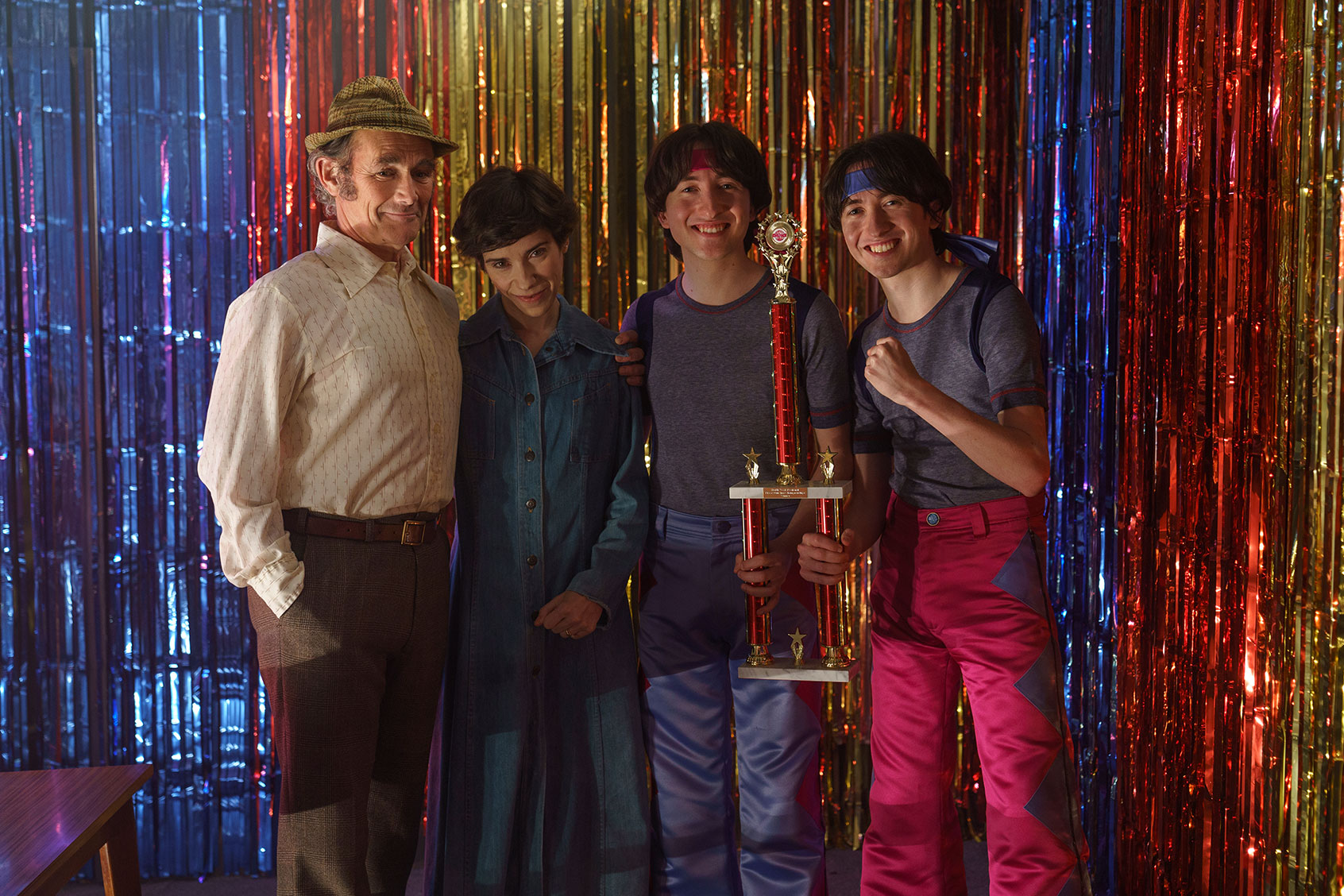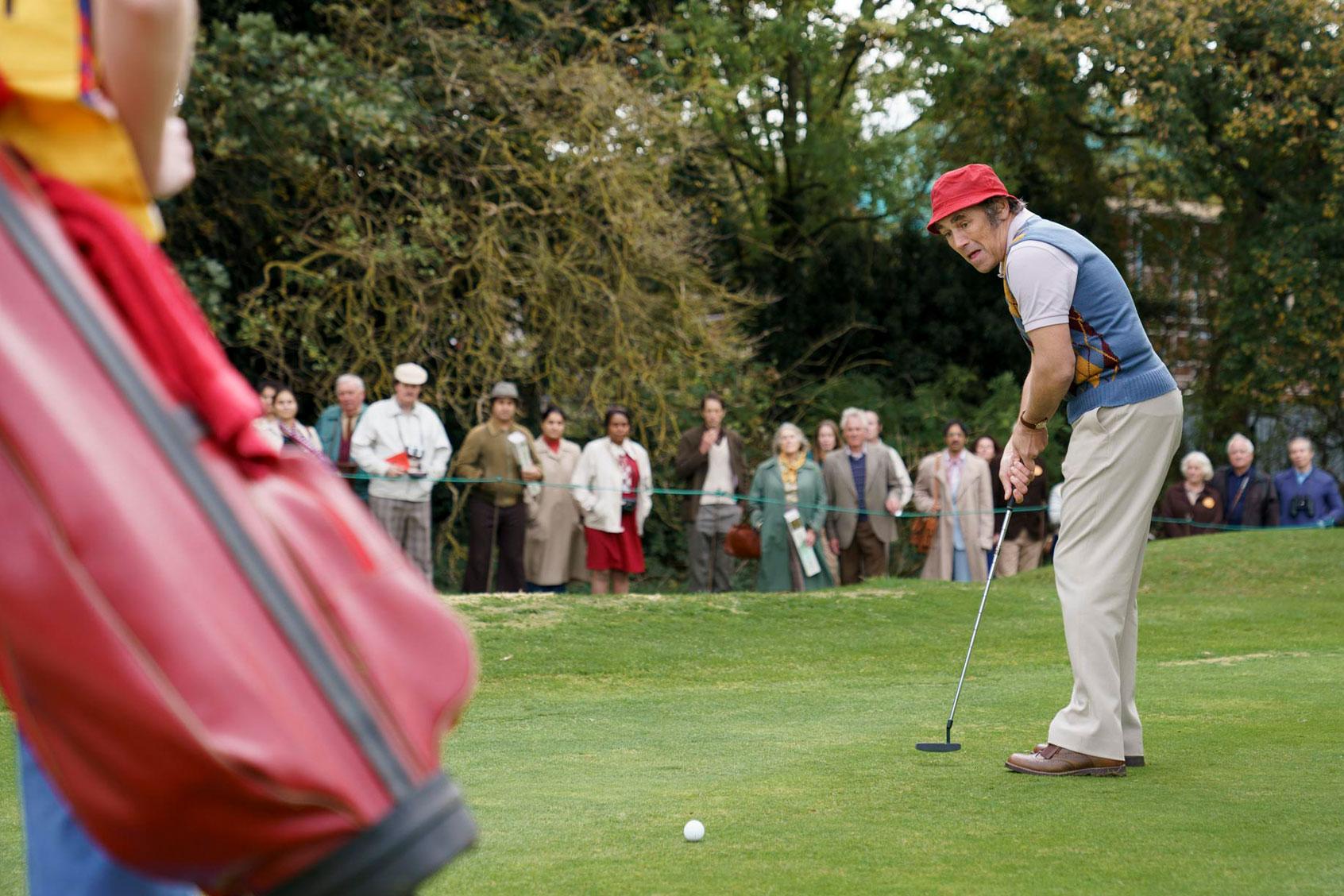Even folks who find watching golf boring will enjoy “The Phantom of the Open,” a warm-hearted, laugh-out-loud comedy about Maurice Flitcroft (Mark Rylance), the man who holds the record for the worst score (121) in the 1976 British Open. Astonishingly, it was Flitcroft’s first full round of golf. How this transpired — and the impact of this dubious achievement — forms the basis of this charming film, which is based on a true story.
Directed by Craig Roberts, from a script by Simon Farnaby (“Paddington 2“) — who adapted the book he cowrote with Scott Murray — this tale of a golfing legend mixes kitchen sink realism with flights of fancy. Flitcroft, who lived in Barrow-in-Furness, had a childhood that held some promise when he was sent to live with others during the war. However, he ended up working in the Vickers shipyard, like his father. It was at the yards where he met his wife, Jean (Sally Hawkins), an unwed mother. He cheerfully raises her son Michael (Jake Davies), and the couple later had twins, Gene (Christian Lees) and James (Jonas Lees).
But when Michael gets a job in the management offices of Vickers, he advises Maurice that the yard is going to become nationalized, which mean redundancies. The possibility of unemployment sparks Maurice to find out what he wants to do. On a whim, after seeing golf on TV, Maurice decides to enter the British Open. Cue a dream sequence with a Van Gogh starry night, a grass staircase out of a Dali painting, and a giant golf tee. As Maurice spirals the globe and lands back on his couch, he sinks a putt and thinks: How hard can golf be?
RELATED: Mark Rylance is the one reason to try on “The Outfit,” a crime drama that looks better than it feels
“The Phantom of the Open” shows just how difficult it is for a self-taught amateur golfer who has no club or sponsor supporting him. But Jean supports him, filling out his entry form, and listing him as a “professional” even as she writes that his handicap is arthritis. When the application is approved by Keith Mackenzie (Rhys Ifans), the tournament chief, Maurice and his colorful argyle sweater vest show up to play. Alas, he left his trusty 4-iron in the car.
Maurice is undaunted by playing his first round of golf on such a grand scale. Yes, he winces, closing his eyes tightly as he swings, as if praying for a decent shot, and his first drive — which travels all of eight feet — is met with a smattering of applause. As he shoots double digits on several holes in the front nine, Mackenzie tries to get Maurice to retire. But the “intrepid hacker,” who maintains that every mistake is an opportunity to learn about golf, refuses. By the time he reaches the 18th hole, Maurice is receiving a standing ovation. (To be fair, everyone clapping was already standing).
And herein lies the moral of Maurice’s story. He dared to try. He tells his twins, as well as his work friends, to go and live their dreams. His sons Gene and James do, becoming international, award-winning disco dancers. It’s corny, but it’s true(!), and it provides the film with an upbeat pop soundtrack.
 Mark Rylance, Sally Hawkins, Christian Lees and Jonas Lees in “Phantom of the Open” (Sony Pictures Classics)
Mark Rylance, Sally Hawkins, Christian Lees and Jonas Lees in “Phantom of the Open” (Sony Pictures Classics)
Moreover, Maurice feels he deserves another chance. However, Mackenzie bans him from playing. So, Maurice comes up with a plan to reenter the tournament under an assumed name (One of them, an end credit reveals, was Arnold Palmtree; such is Maurice’s sense of humor.) “The Phantom of the Open” descends into goofball comedy as Maurice and his caddy are chased off the green after their ruse is discovered, but that does not stop him. (He reenters a few more times, but the film only touches on this aspect of his legend).
Most of this affable film celebrates Maurice’s epic failure. He practically encourages people to laugh with him, holding up signs with his mantra, “Practice is the road to perfection.” He proves himself to be a true underdog, and as his game improves, Maurice is no less beloved, even being feted by an American tournament in his name.
But his son Michael is embarrassed, and his management colleagues are laughing at him. They are also angry that he has disparaged the Vickers name (the shipyard is cited as Maurice’s sponsor). The father-son conflict, which is really about class and social mobility, generates some of the heart in the film as Michael needs to learn to embrace his humble father, rather than treat him with disdain. It tips the film towards the sappy, but this feel-good comedy needs some emotional heart-tugging. (Maurice’s battle with Mackenzie is more comic than dramatic.)
Want a daily wrap-up of all the news and commentary Salon has to offer? Subscribe to our morning newsletter, Crash Course.
Rylance gives a winning performance as Maurice, a cockeyed optimist who may be naïve, but has a sly quality about him. His exchange with a Spanish golfer in the locker room before the Open is both touching and funny, and his scenes with Jean are sweet. As his supportive wife, Sally Hawkins is amusing when she meets a reporter (Ash Tandon) who informs her of Maurice’s performance at the Open, but she is also steely when she chastises Michael for his behavior towards the man who raised him. However, it is a pretty one-note role.
Nevertheless, “The Phantom of the Open” is as appealing as Maurice Flitcroft. It is impossible not to be inspired by his incredible story.
“The Phantom of the Open” is in theaters beginning June 3.
More stories to read:

